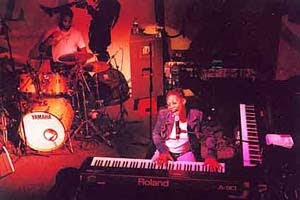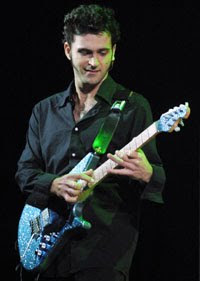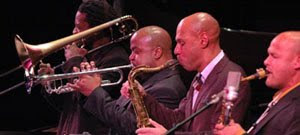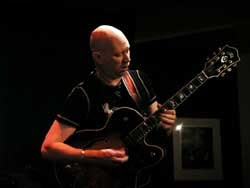 My good friend, bassist Liza Albright first turned me onto the pianist, composer and vocalist Rachelle Ferrell, via her fantastic "Individuality" CD, her third effort and a very fine release. I was completely blown away with her song, "Why You Wanna Mess It All Up?". When Ferrell burst onto the contemporary jazz scene in the early nineties, she provided not only one of the most powerful and unique new voices in music, but also an important bridge between R&B and jazz. Equally at home singing contemporary R&B soul or straight-ahead jazz, Rachelle Ferrell is a musical anomaly — not so much because she can do both — but because she does both so well. Rachelle's musicianship, songwriting, intuition and astonishing six-octave vocal range set her apart from her contemporaries. With her sophisticated melodies, smooth grooves and stunning voice, Rachelle Ferrell and her R&B band launch their debut performance at Yoshi’s.
My good friend, bassist Liza Albright first turned me onto the pianist, composer and vocalist Rachelle Ferrell, via her fantastic "Individuality" CD, her third effort and a very fine release. I was completely blown away with her song, "Why You Wanna Mess It All Up?". When Ferrell burst onto the contemporary jazz scene in the early nineties, she provided not only one of the most powerful and unique new voices in music, but also an important bridge between R&B and jazz. Equally at home singing contemporary R&B soul or straight-ahead jazz, Rachelle Ferrell is a musical anomaly — not so much because she can do both — but because she does both so well. Rachelle's musicianship, songwriting, intuition and astonishing six-octave vocal range set her apart from her contemporaries. With her sophisticated melodies, smooth grooves and stunning voice, Rachelle Ferrell and her R&B band launch their debut performance at Yoshi’s.Richard Skelly of the "All Music Guide" wrote that, "Ferrell is a recent arrival on the contemporary jazz scene, but her visibility on the pop / urban contemporary scene has boosted her audience's interest in her jazz recordings. Born and raised in Philadelphia, Ferrell got started singing in the second grade at age six. This no doubt contributed to the eventual development of her startling six-and-change octave range. She decided early on, after classical training on violin, that she wanted to try to make her mark musically as an instrumentalist and songwriter. In her mid-teens, her father bought her a piano with the provision that she learn to play to a professional level. Within six months, Ferrell had secured her first professional gig as a pianist / singer. She began performing at 13 as a violinist, and in her mid-teens as a pianist and vocalist. At 18, she enrolled in the Berklee College of Music in Boston to study composition and arranging, where her classmates included Branford Marsalis, Kevin Eubanks, Donald Harrison and Jeff Watts. She graduated in a year and taught music for awhile with Dizzy Gillespie for the New Jersey State Council on the Arts. Through the 1980's and into the early '90's, she'd worked with some of the top names in jazz, including Dizzy Gillespie, Quincy Jones, George Benson and George Duke.
Ferrell's debut, 'First Instrument', was released in 1990 in Japan only. Recorded with bassist Tyrone Brown, pianist Eddie Green and drummer Doug Nally, an all-star cast of accompanists also leave their mark on her record. They include trumpeter Terrence Blanchard, pianists Gil Goldstein and Michel Petrucciani, bassists Kenny Davis and Stanley Clarke, tenor saxophonist Wayne Shorter and keyboardist Pete Levin. Her unique take on now-standards like Sam Cooke's 'You Send Me,' Cole Porter's 'What Is This Thing Called Love,' and Rodgers & Hart's 'My Funny Valentine,' captured the hearts and souls of the Japanese jazz-buying public. In 1995, Blue Note / Capitol released her Japanese debut for U.S. audiences, and the response was similarly positive. Her 1992 self-titled U.S. debut, a more urban pop/contemporary album, was released on Capitol Records. Ferrell was signed to a unique two-label contract, recording pop and urban contemporary for Capitol Records and jazz music for Blue Note Records. For four consecutive years in the early '90's, Ferrell put in festival stopping performances at the Montreaux Jazz Festival.
"Any musician worth her weight in gold records will tell you that the struggle between expressing one's creativity and personifying the image that label executives create is often frustrating." Ferrell, in a 2000 interview with Essence magazine, spoke about how her 1992 self-titled debut was marred by a battle for control over her career. Eventually the singer became completely disillusioned with the music business and stopped recording and writing for a while: "I was prepared never to record again," she says. Ferrell says that the central theme of that eight-year hiatus was "individuality--giving myself permission to be who I am." Ferrell got back on the scene with a new attitude, a revamped look and the aptly titled album Individuality (Can I Be Me?). "This entire album was written from the space of personal experience," Ferrell says proudly. "I'm so grateful to be able to express these things. It's beautiful to be in a daily state of gratitude."
Although Ferrell has captured the jazz public's attention as a vocalist, she continues to compose and write songs on piano and violin. Ferrell's work ethic has paid off, and Gillespie's predictions about her becoming a 'major force' in the jazz industry came true. Her prolific songwriting abilities and ability to accompany herself on piano seem only to further her natural talent as a vocalist.
'Some people sing songs like they wear clothing, they put it on and take it off,' she explains in the biographical notes accompanying 'First Instrument'. 'But when one performs four sets a night, six nights a week, that experience affords you the opportunity to present the song from the inside out, to express its essence. In this way, a singer expresses the song in the spirit in which it was written, the songwriter then translates emotion into words, the singer's job is to translate the words back into emotion.' Rachelle Ferrell has made her mark not as a straightahead jazz singer and pianist, but as a crossover artist who's equally at home with urban contemporary pop, gospel, classical music and jazz. Expect more great vocal albums, both jazz and pop, from this one-of-a-kind vocalist, arranger, songwriter and instrumentalist."
The very popular D.C. area vocalist Mary Ann Redmond, often reminded me of Ferrell when I first heard her, but Ferrell's six-octave voice is nothing short of mind-bending, and could even give the great Tuvan throat-singer Ondar, a run for his money. No, there is no one quite like Ferrell, so do yourself a favor, and don't miss this weekend's debut. Thanks for turning me on to her Liza, and I'll see you both at Yoshi's!
Rachelle Ferrell
Yoshi's at Jack London Square, Oakland
Friday, April 28 – Sunday, April 30 Fri & Sat 8:00pm & 10:00pm Shows $30
Sun 2:00pm Matinee, $5 Kids, $15 Adult W/One Kid, $30
General Sun 8:00pm Show $30




